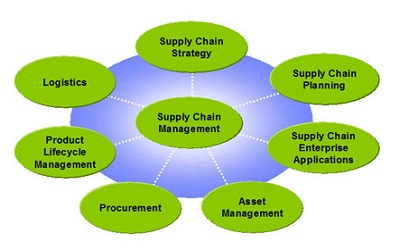Supply Chain Management Assignment Help Online
Supply chain management (SCM) is the systematic planning, organization, control, and optimization of the flow of materials, information, finances, and services from the initial supplier of raw materials through the various stages of production and distribution to the final customer. The primary goal of supply chain management is to ensure that the right products or services are delivered to the right place at the right time, while minimizing costs and maximizing overall efficiency and customer satisfaction. Key components of supply chain management include:
- Planning: Developing strategies and plans to meet customer demand and align supply chain activities with organizational goals. This includes demand forecasting, production planning, and inventory management.
- Sourcing: Identifying and selecting suppliers, negotiating contracts, and managing relationships with suppliers to ensure a reliable and cost-effective supply of goods and services.
- Production: Managing the manufacturing or assembly processes efficiently to produce products or services in line with customer demand while minimizing waste and costs.
- Inventory Management: Optimizing inventory levels to balance supply and demand, reduce carrying costs, and prevent stockouts or overstock situations.
- Logistics: Planning and coordinating the movement of goods, including transportation, warehousing, distribution, and order fulfillment, to ensure products reach their destinations efficiently and on time.
- Information Flow: Ensuring that accurate and timely information is shared throughout the supply chain to enable better decision-making, coordination, and visibility.
- Risk Management: Identifying and mitigating risks that can disrupt the supply chain, such as natural disasters, geopolitical issues, or supply chain interruptions.
- Performance Measurement: Establishing key performance indicators (KPIs) to measure the effectiveness and efficiency of supply chain operations, allowing for continuous improvement.
Types Of Supply Chain Management Assignments
 Supply chain management involves collaboration among various stakeholders, including suppliers, manufacturers, distributors, retailers, and customers, to create a seamless and responsive network that adds value while reducing costs and waste. It plays a critical role in today’s globalized business environment, helping organizations remain competitive, agile, and adaptable to changing market conditions. Supply chain management assignments can cover a wide range of topics and tasks, depending on the level of education and the specific course or program you are enrolled in. Here are some common types of assignments you might encounter in a supply chain management course:
Supply chain management involves collaboration among various stakeholders, including suppliers, manufacturers, distributors, retailers, and customers, to create a seamless and responsive network that adds value while reducing costs and waste. It plays a critical role in today’s globalized business environment, helping organizations remain competitive, agile, and adaptable to changing market conditions. Supply chain management assignments can cover a wide range of topics and tasks, depending on the level of education and the specific course or program you are enrolled in. Here are some common types of assignments you might encounter in a supply chain management course:
- Case Studies: Analyzing real-world supply chain problems or scenarios to identify issues, propose solutions, and make recommendations based on course concepts and principles.
- Research Papers: Conducting research on a specific supply chain-related topic, such as a case study of a particular company’s supply chain practices, emerging supply chain technologies, or a review of supply chain management literature.
- Supply Chain Simulation Games: Participating in supply chain simulation exercises or games that simulate real-world supply chain dynamics, where you make decisions about inventory, production, and distribution to optimize performance.
- Supply Chain Network Design: Designing and optimizing a supply chain network for a given company, considering factors like location of facilities, transportation modes, and inventory strategies.
- Inventory Management Analysis: Analyzing a company’s inventory management practices and proposing improvements to reduce costs while maintaining customer service levels.
- Demand Forecasting Exercises: Working with historical data to forecast demand for a product or service, and then assessing the accuracy of the forecast and its implications for inventory management.
- Supplier Evaluation and Selection: Developing criteria for evaluating and selecting suppliers for a particular product or service, considering factors such as cost, quality, and reliability.
- Logistics and Transportation Optimization: Solving optimization problems related to logistics and transportation, such as finding the most cost-effective route or mode of transportation.
- Supply Chain Risk Assessment: Identifying and assessing risks within a supply chain and proposing strategies to mitigate those risks, including risk mapping and contingency planning.
- Supply Chain Sustainability Analysis: Evaluating a company’s supply chain from a sustainability perspective, considering environmental and social factors, and suggesting sustainability improvements.
- Supply Chain Performance Metrics: Analyzing and interpreting key performance indicators (KPIs) for a specific supply chain and proposing actions to improve performance.
- Ethical Supply Chain Analysis: Investigating ethical issues within a supply chain, such as labor practices or environmental impact, and proposing ethical and responsible supply chain practices.
- Supply Chain Technology Assessment: Assessing the potential impact of emerging technologies like blockchain, IoT, or AI on supply chain operations and making recommendations for adoption.
- Supply Chain Presentation: Preparing and delivering a presentation on a supply chain-related topic, often in a team setting, to communicate findings and recommendations effectively.
- Supply Chain Management Software Usage: Using supply chain management software or tools to solve specific supply chain problems or analyze data.
These assignments are designed to help students develop a deep understanding of supply chain management concepts and their practical applications. They often require critical thinking, data analysis, problem-solving, and effective communication skills. The specific assignments you receive will depend on your course syllabus and the objectives of your supply chain management program.
Author: Ask Assignment Help
Connect with Ask Assignment Help for urgent assignment help, online exam help, dissertation writing service & online coursework help for all subjects. Order now to get 25% off on all assignments now.

